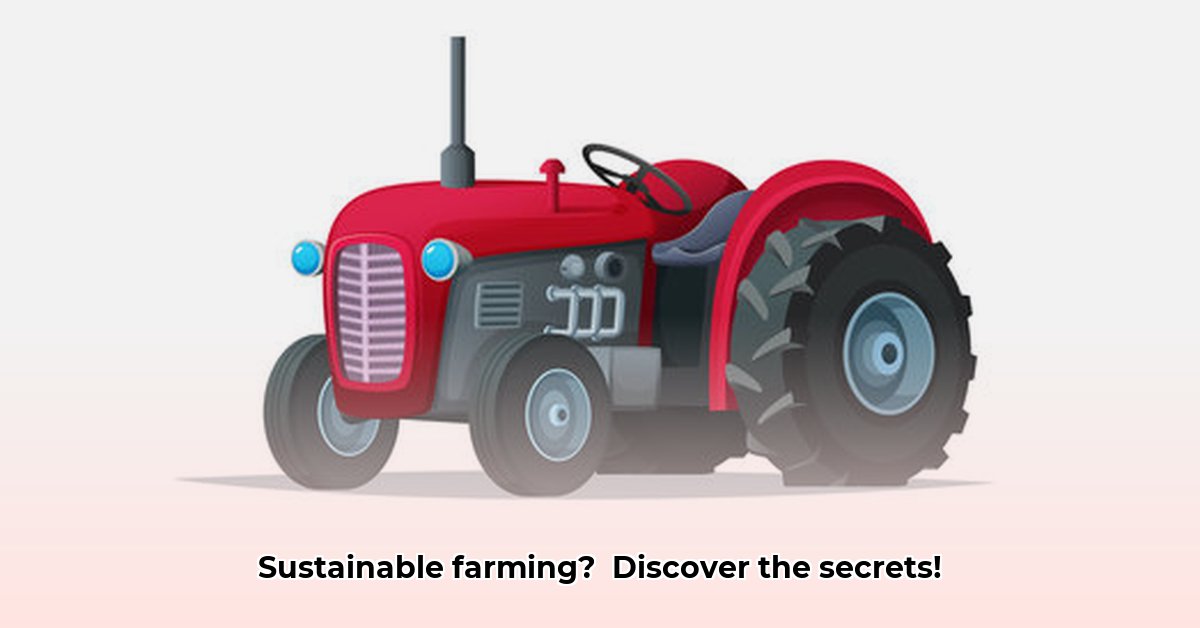
Red Tractor Revolution: The Smart, Sustainable Future of Farming
That charming red tractor image—it's more than just nostalgia. It symbolizes a dramatic shift in agriculture, one powered by technology and driven by sustainability. This isn't your grandfather's farm; precision agriculture, using data-driven techniques, is boosting yields while protecting our planet. We'll explore how sustainable farming benefits everyone, provide actionable steps to implement precision farming, and examine real-world successes. Sustainable farming isn't just environmentally responsible; it's economically smart and strengthens our communities. Learn more about maintaining your equipment with this guide on tractor winterization. Let's cultivate a better future, one farm at a time.
Precision Farming: Beyond High-Tech Tractors
Precision farming is a sophisticated system, not just about fancy equipment. It leverages smart tools and technology to increase efficiency. This includes sensors, GPS, and powerful software to help farmers make better decisions. The outcome? Less waste, higher harvests, and a healthier planet. Think of it as providing plants with a tailored approach, maximizing their potential.
For instance, instead of blanket fertilizer application, sensors identify areas needing nutrients. This targeted approach minimizes chemical runoff, protecting our waterways. Similarly, smart irrigation systems precisely deliver water only where needed, conserving valuable resources. This approach translates to significant savings in both water and energy consumption. Isn't it amazing how technology can help us to conserve nature resources?
Data-Driven Decisions: Harvesting Insights for Bountiful Yields
Precision farming hinges on data. Sensors act as highly efficient plant detectives, gathering real-time information on various factors: soil health, plant growth, and weather patterns. Specialized software analyzes this data, offering farmers a comprehensive understanding of their fields. This allows for immediate adjustments to farming practices, maximizing efficiency.
This data-driven approach isn't just about maximizing yields; it's about responsible farming. By using data to inform their choices, farmers can significantly reduce their environmental footprint. This balance between productivity and environmental stewardship is key to creating a truly sustainable agriculture industry.
Sustainable Practices: Beyond Technology
Sustainable agriculture is broader than just technology; it's a comprehensive approach encompassing every stage of food production, from seed to plate. Key sustainable farming practices include:
Crop Rotation: Alternating crops year after year maintains soil health and minimizes pest infestations. This natural soil regeneration approach promotes long-term health and vitality.
Cover Cropping: Planting secondary crops between primary harvests prevents soil erosion and enriches the soil with nutrients. This natural soil protection strategy helps conserve this vital resource.
Integrated Pest Management: Combining biological and chemical controls minimizes pesticide use, promoting environmentally friendly pest control techniques.
The combination of precision farming technology and these traditional sustainable practices creates a powerful synergy, resulting in a more robust and environmentally friendly system. It’s a collaborative approach that benefits both the planet and people.
Challenges and Opportunities: Navigating the Transition
While the potential benefits of precision farming are significant, challenges remain. The initial investment in technology can be substantial for some farmers, requiring financial planning and potential access to funding mechanisms. Furthermore, adequate training and support are crucial for farmers to effectively utilize these new tools. Addressing data privacy and security is also critical.
However, the long-term advantages – greater yields, reduced costs, and a smaller environmental impact – far outweigh these challenges. This technological advancement is an investment in a more sustainable and profitable future for agriculture.
The Future of Farming: Embracing a Smarter, Greener Approach
That simple red tractor image represents a transformation in agriculture. It symbolizes innovation, efficiency, and sustainability. By embracing technology and sustainable practices, we can create a more resilient and eco-conscious food system. The possibilities are immense. Don't you think that sustainable agriculture practice contribute to the healthier planet and healthier human being?
Actionable Steps: Your Role in a Sustainable Future
Want to contribute to this positive change? Here's how:
Support Local, Sustainable Farms: Purchase produce from farms committed to sustainable practices. This directly supports farmers dedicated to environmentally responsible agriculture.
Minimize Food Waste: Plan meals meticulously, store food correctly, and compost food scraps. Reducing food waste is environmentally beneficial.
Expand Your Knowledge: Learn about sustainable agriculture and precision farming. Increased awareness leads to better understanding and informed choices.
The simple red tractor image is a symbol of hope, highlighting the transformative potential of agriculture. Let's collaborate to achieve a future where farming is simultaneously productive and sustainable. The potential is immense, and we can all make a difference.